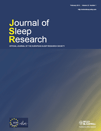Evening ambient light exposure can reduce circadian phase advances to morning light independent of sleep deprivation
Summary
Short sleep/dark durations are common in modern society. We investigated if exposure to additional evening ambient light, often associated with later bedtimes and short sleep, reduces circadian phase advances to morning bright light. Twelve healthy subjects participated in two conditions that differed in the distribution of sleep before exposure to morning bright light. Subjects had a consolidated 9-h night time sleep opportunity, or a 3-h daytime nap followed by a 6-h night time sleep opportunity, each before morning bright light. Eight of the 12 subjects obtained similar amounts of sleep in both conditions, and yet still showed significant reductions in phase advances with 6-h nights (1.7 versus 0.7 h, P < 0.05). These results suggest that the exposure to additional evening ambient light often associated with short sleep episodes can significantly reduce phase advances to morning light, and may therefore increase the risk for circadian misalignment.




